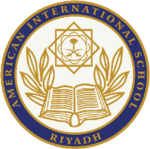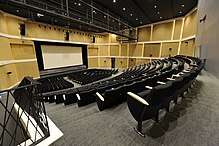American International School – Riyadh
The American International School – Riyadh (AIS-R) (previously known as American Preparatory School of Riyadh, RICS and SAIS-R[2] is an independent, non-profit, K-12, coeducational day school following an American-based curriculum with a focus on international perspectives. The IB Diploma Program is also offered in the high school. The school was established in 1963, and is located in the kingdom's capital, Riyadh.
| American International School – Riyadh | |
|---|---|
 Official Logo of the American International School - Riyadh[1] | |
| Location | |
| Information | |
| Type | Independent |
| Established | 1963 |
| Superintendent | Dr. Brian Matthews |
| Faculty | 225 |
| Number of students | 1600+ |
| Website | www |
Overview & History
Governed by a strategic Board of Trustees, the American International School – Riyadh is an independent, non-profit, co-educational school offering an American curriculum with an international perspective for students from pre-Kindergarten to Grade 12. Founded in 1963, AIS-R is currently in its 54th year on a newly built campus in North Riyadh. AIS-R offers the International Baccalaureate Diploma, is accredited by the New England Association of Schools and Colleges (NEASC) and the Council of International Schools (CIS), and was awarded International Certification - with its focus on enhancing global citizenship - by CIS in the spring of 2017.[3]
The school that is known today as the American International School – Riyadh (AIS-R) has a well-established history in Riyadh. It was first formed by parents in 1963 and served students from kindergarten through third grade with only seven students enrolled. In 1965, what was previously called APS merged with a Ford Foundation school to form the Riyadh International Community School (RICS).[2] As the capital of Riyadh grew between 1965–74, so too did the school's student body. Between 1974-79, RICS' enrollment increased rapidly from 400 students to more than 1,500. In 1977, after several moves to accommodate increasing enrollment, the school opened on its next site in South Riyadh. In 1982, the school name was changed again, this time to the Saudi Arabian International School - Riyadh (SAIS-R). The school has grown considerably since its inception, however, its peak enrollment of 2,750 students occurred in the 1984-85 school year.[2] Today, on the school's new campus, enrollment is near capacity with more than 1600 students from more than 55 nations.[4][3] With the school's growth in enrollment came the expansion of curriculum, facilities, services, programs, and grade levels. The school name was once again changed to its present name - AIS-R - in 1999.[2] In 2014 AIS-R moved to its new campus in the northern region of Riyadh. The campus was built in cooperation with Al Bustan Village (a 1200 unit western - residential compound).
Academic Program
AIS-R provides a college preparatory educational program in the English language and offers both the U.S. High School Diploma and the International Baccalaureate Diploma Program (DP). A majority of High School students undertake the full IB Diploma. All students take internal examinations and some take DP courses and sit for external examinations. AIS-R's school year consists of two semesters beginning in September and ending in mid-June. Students enroll in a maximum of eight courses using a 4 X 4 block alternating Day 1/Day 2 schedule and all classes are 75 minutes in length (IB HL classes meet for an average of 95 minutes per block within this schedule). One-half credit is awarded for the successful completion of each semester course with a passing mark of D-. Graduation requirements include a minimum of 24 credits including 12.5 hours of community service for each year at AIS-R both of which are indicated on the transcript. Higher Level and Standard Level IB Diploma Program courses include English Language and Literature A, Arabic B, French B, Spanish B, Biology, Chemistry, Physics, Mathematics, Visual Arts, Theater, Global Politics, Economics, and Business and Management. Math Studies and the Nature of Science are offered at the Standard Level only. 100% of AIS-R teachers are licensed and certified to instruct in all U.S. Diploma courses and IBDP courses.[5]
Facilities
Facilities include more than 100 classrooms, 2 dining halls, 2 gymnasiums, 2 soccer fields, tennis courts, running track, 2 Learning Commons, a 650-seat theater, art gallery Broadcast Journalism Studio, Dance Studio, 4 STEM labs, 12 science labs, 3 fully integrated computer labs, 3 mobile laptop stations, Eagle's Nest Store and Cafe, Parent Lounge, Subway, Za3tarino, Seattle's Best Coffee, juice bar, salad bar, gardens, covered courts and playgrounds.[6]


Faculty and Students
AIS-R's organization consists of 156 faculty, 66 educational assistants and support staff. Of AIS-R's faculty, 80 are from the U.S., 39 from Canada, and the remaining 37 primarily from Europe, Australia, and New Zealand. Faculty members hold bachelor's degrees, credentials and teaching licenses in their subject areas; 88 have also earned a masters, and 5 have obtained a doctorate. AIS-R's current enrollment is 1,618 students.[6]
Extracurricular Activities
Extracurricular activities include Student Council, Model United Nations, National Honor Society, TEDxYouth, Aspiring Doctors, International Schools Math Teachers Foundation (ISMTF), Drama, Musical and Performing Arts productions. Varsity and Junior Varsity teams compete in the International Schools Sports League of Riyadh (ISSLR) and the Saudi Arabian Intra-Kingdom Activities Conference (SAIKAC); in Volleyball, Soccer, Basketball, Track and Field, Tennis, Cricket, Badminton, Softball and Cross Country.[5]
See also
References
- "AIS-R kostarica".
- "American International School, Riyadh: History". www.aisr.org.
- "American International School, Riyadh: Our Community". www.aisr.org.
- United States Department of State
- "American International School, Riyadh: High School Profile". www.aisr.org.
- "Saudi Arabia, Riyadh: American International School - Ryadh". U.S. Department of State.